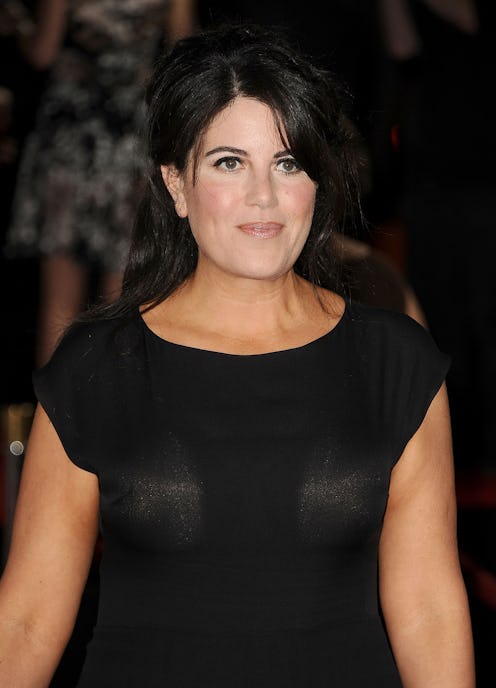News
Monica Lewinsky On Feminism, Hillary & Beyonce

Just in case you forgot about America's most controversial intern, Monica Lewinsky's essay in Vanity Fair serves as a reminder that you can always return to the nation's spotlight. This time around, however, it's about redemption for the former White House employee. 16 years later, Lewinsky speaks out about her affair with President Bill Clinton, addressing the 1998 sex scandal head-on: "I am determined to have a different ending to my story."
News of her tell-all has sparked theories on exactly why Lewinsky is speaking out now. But regardless of her reasons, she tries not necessarily to clear her own name, but to clear the air and give some never-before-seen insight into went down before and after the notorious political firestorm. Lewinsky, now 40, provides some reflection on her 23-year-old self, what it's taken to move on, and the regrets she's had along the way.
"It's time to burn the beret and bury the blue dress," she writes —but not without one final fanfare that's sure to rekindle her status as a household name. Check out 5 revealing takeaways from Lewinsky's 4,300-word Vanity Fair essay...
On Suicide
Lewinsky's back in the limelight to help others with her experience, she says. The 2010 suicide of 18-year-old Tyler Clementi brought back some dark memories for her. Clementi, a Rutgers freshman, killed himself after his kiss with another man was secretly streamed online.
While Lewinsky has never actually attempted suicide, she was faced such thoughts during the scandal investigations and in periods afterward. It was especially tough on her mom. She writes:
She was reliving 1998, when she wouldn’t let me out of her sight. She was replaying those weeks when she stayed by my bed, night after night, because I, too, was suicidal. The shame, the scorn, and the fear that had been thrown at her daughter left her afraid that I would take my own life—a fear that I would be literally humiliated to death...my own suffering took on a different meaning. Perhaps by sharing my story, I reasoned, I might be able to help others in their darkest moments of humiliation. The question became: How do I find and give a purpose to my past?
She also goes on to say she was "also possibly the first person whose global humiliation was driven by the Internet" and as a result, wants to publicly speak out on behalf of victims of online humiliation and harassment.
On Beef with Beyoncé
Apparently, Lewinsky has no fear of the Beygenc y , as she not-so-subtly throws shade at Queen B in her essay. Addressing the endless pop-culture references she still faces, she attempts to correct Beyoncé in her "Partition" lyrics in which the star sings, "He popped all my buttons and he ripped my blouse. He Monica Lewinski'd all on my gown."
Lewinsky argues on the inaccuracy, saying, "Thanks, Beyoncé, but if we’re verbing, I think you meant ‘Bill Clinton’d all on my gown,’ not 'Monica Lewinsky’d.'"
On Hillary Clinton
During Hillary's run for president in 2008, Lewinsky says she became reclusive and feared that she would be used for political purposes. Even now, as talks swirl around the former Secretary of State's bid for the top White House seat, Lewinsky maintains that she's still a little "gun shy."
She also talks about recent reports that Hillary called her a "narcissistic loony toon" in correspondence that she had with friend Diane Blair.
My first thought as I was getting up to speed: If that’s the worst thing she said, I should be so lucky. Mrs. Clinton, I read, had supposedly confided to Blair that, in part, she blamed herself for her husband’s affair (by being emotionally neglectful) and seemed to forgive him. Although she regarded Bill as having engaged in ‘gross inappropriate behavior,’ the affair was, nonetheless, ‘consensual (was not a power relationship).’
On Regrets
She still feels the same way she did all those years ago. Though she insists her relationship with the president was consensual, Lewinsky still expresses some remorse for the affair.
"I, myself, deeply regret what happened between me and President Clinton. Let me say it again: I. Myself. Deeply. Regret. What. Happened," she writes.
Sure, my boss took advantage of me, but I will always remain firm on this point: it was a consensual relationship. Any ‘abuse’ came in the aftermath, when I was made a scapegoat in order to protect his powerful position. . . . The Clinton administration, the special prosecutor’s minions, the political operatives on both sides of the aisle, and the media were able to brand me. And that brand stuck, in part because it was imbued with power.
The public humiliation took its toll on her, as it would with anyone, but now she's getting past the abuse, she says. Perhaps not as soon as she'd hope though, as the media is sure to throw Lewinsky into debates with her reemergence.
On Feminism
Don't call her a feminist. Citing the less-than-positive treatment she received back in the 90s, Lewinsky explains her views on feminism.
I still have deep respect for feminism and am thankful for the great strides the movement has made in advancing women's rights over the past few decades. But, given my experience of being passed around like gender-politics cocktail food, I don't identify myself as a Feminist, capital F. The movement's leaders failed in articulating a position that was not essentially anti-woman during the witch hunt of 1998.
Referencing an article that featured the views of women such as Erica Jong and Nancy Friday, she writes, "I sorely wished for some sign of understanding from the feminist camp. Some good, old-fashioned, girl-on-girl support was much in need. None came."